裕兴版新概念英语第二册笔记第2课
- 格式:doc
- 大小:96.00 KB
- 文档页数:11
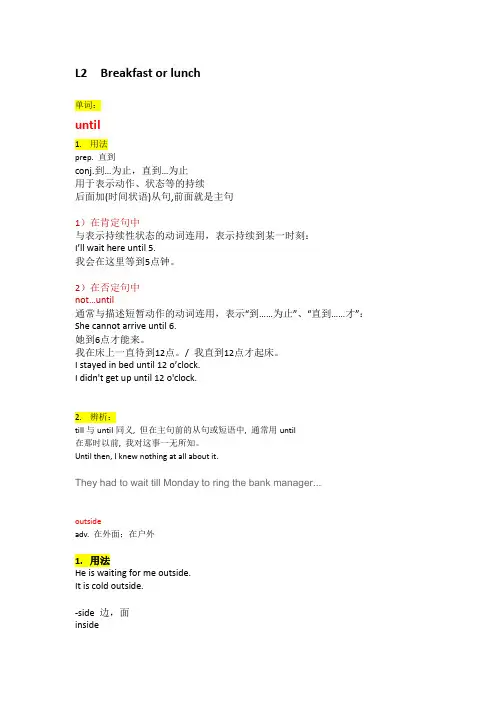
L2 Breakfast or lunch单词:until1.用法prep. 直到conj.到…为止,直到…为止用于表示动作、状态等的持续后面加(时间状语)从句,前面就是主句1)在肯定句中与表示持续性状态的动词连用,表示持续到某一时刻:I’ll wait here until 5.我会在这里等到5点钟。
2)在否定句中not…until通常与描述短暂动作的动词连用,表示“到……为止”、“直到……才”:She cannot arrive until 6.她到6点才能来。
我在床上一直待到12点。
/ 我直到12点才起床。
I stayed in bed until 12 o’clock.I didn't get up until 12 o'clock.2.辨析:till与until同义, 但在主句前的从句或短语中, 通常用until在那时以前, 我对这事一无所知。
Until then, I knew nothing at all about it.They had to wait till Monday to ring the bank manager...outsideadv. 在外面;在户外1.用法He is waiting for me outside.It is cold outside.-side 边,面insidecountryside农村the outside of the house房子外部outside help 外援外面太冷,不要出去了。
Don’t go outside because it’s too cold outside.at the (very) outside 至多,充其量2.拓展:Outsider 《局外人》ring1. 用法:1) v. (铃、电话等)响;给某人打电话Ring up 打电话Ring sb. 给某人打电话Ring off 挂断电话2) n. 戒指;铃声,打电话give sb. a ringRemember to give me a ring.Remember to ring me.2.拓展:ring finger 无名指.Thumb 大拇指Index finger 食指Middle finger 中指Little finger 小拇指The Lord of the rings 《指环王》Give me a ring!打电话给我。
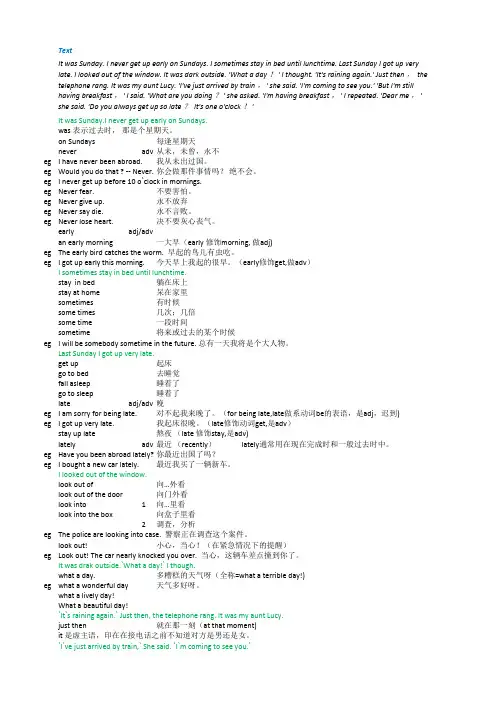
TextIt was Sunday. I never get up early on Sundays. I sometimes stay in bed until lunchtime. Last Sunday I got up very late. I looked out of the window. It was dark outside. 'What a day!' I thought. 'It's raining again.' Just then, the telephone rang. It was my aunt Lucy. 'I've just arrived by train,' she said. 'I'm coming to see you.' 'But I'm still having breakfast,' I said. 'What are you doing?' she asked. 'I'm having breakfast,' I repeated. 'Dear me,' she said. 'Do you always get up so late? It's one o'clock!'It was Sunday.I never get up early on Sundays.was 表示过去时,那是个星期天。
on Sundays每逢星期天never adv从未,未曾,永不eg I have never been abroad.我从未出过国。
eg Would you do that ? -- Never.你会做那件事情吗?绝不会。
eg I never get up before 10 o`clock in mornings.eg Never fear.不要害怕。
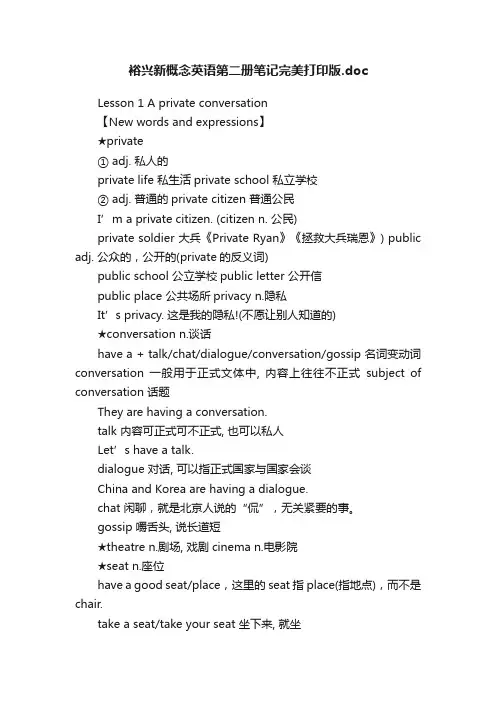
裕兴新概念英语第二册笔记完美打印版.docLesson 1 A private conversation【New words and expressions】★private① adj. 私人的private life 私生活private school 私立学校② adj. 普通的private citizen 普通公民I’m a private citizen. (citizen n. 公民)private soldier 大兵《Private Ryan》《拯救大兵瑞恩》) public adj. 公众的,公开的(private的反义词)public school 公立学校public letter 公开信public place 公共场所privacy n.隐私It’s privacy. 这是我的隐私!(不愿让别人知道的)★conversation n.谈话have a + talk/chat/dialogue/conversation/gossip 名词变动词conversation 一般用于正式文体中, 内容上往往不正式subject of conversation 话题They are having a conversation.talk 内容可正式可不正式, 也可以私人Let’s have a talk.dialogue 对话, 可以指正式国家与国家会谈China and Korea are having a dialogue.chat 闲聊,就是北京人说的“侃”,无关紧要的事。
gossip 嚼舌头, 说长道短★theatre n.剧场, 戏剧cinema n.电影院★seat n.座位have a good seat/place,这里的seat指place(指地点),而不是chair.take a seat/take your seat 坐下来, 就坐Is the seat taken? 这个位置有人吗?请坐的3种说法:Sit down, please. (命令性)Take your seat, please.Be seated, please. (更礼貌)作为动词的seat与sit的区别sit(sat,)vi. 就座He is sitting there.他坐在那儿。
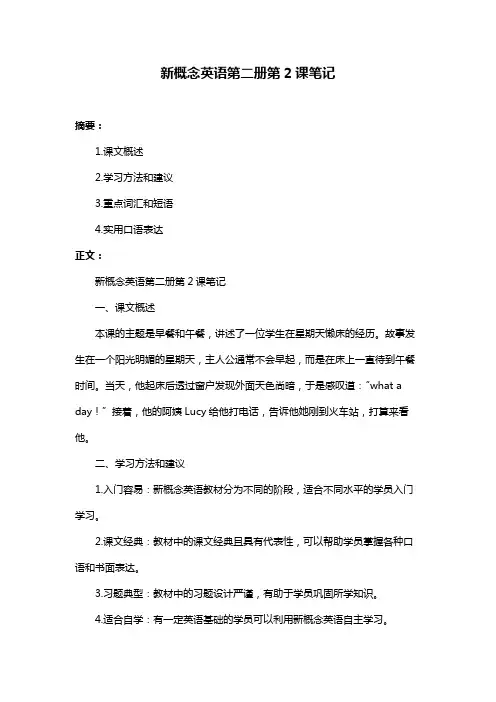
新概念英语第二册第2课笔记摘要:1.课文概述2.学习方法和建议3.重点词汇和短语4.实用口语表达正文:新概念英语第二册第2课笔记一、课文概述本课的主题是早餐和午餐,讲述了一位学生在星期天懒床的经历。
故事发生在一个阳光明媚的星期天,主人公通常不会早起,而是在床上一直待到午餐时间。
当天,他起床后透过窗户发现外面天色尚暗,于是感叹道:“what a day!”接着,他的阿姨Lucy给他打电话,告诉他她刚到火车站,打算来看他。
二、学习方法和建议1.入门容易:新概念英语教材分为不同的阶段,适合不同水平的学员入门学习。
2.课文经典:教材中的课文经典且具有代表性,可以帮助学员掌握各种口语和书面表达。
3.习题典型:教材中的习题设计严谨,有助于学员巩固所学知识。
4.适合自学:有一定英语基础的学员可以利用新概念英语自主学习。
三、重点词汇和短语1.breakfast(早餐)2.lunch(午餐)3.get up(起床)4.stay in bed(躺在床上)5.look out of the window(透过窗户往外看)6.what a day!(真是的一天!)四、实用口语表达1.What do you want for breakfast/lunch?(你想吃早餐/午餐吃什么?)2.I usually have bread and milk for breakfast./I prefer lunch to breakfast.(我通常早餐吃面包和牛奶。
/我觉得午餐比早餐好吃。
)3.Do you like having breakfast/lunch together?(你喜欢和我们一起吃早餐/午餐吗?)4.I"d like to try something new for breakfast./Lunch.(我想尝试一下早餐/午餐吃点新鲜的东西。
)通过本课的学习,我们可以了解到如何在日常生活中用英语表达早餐、午餐的相关话题,以及星期天的休闲活动。
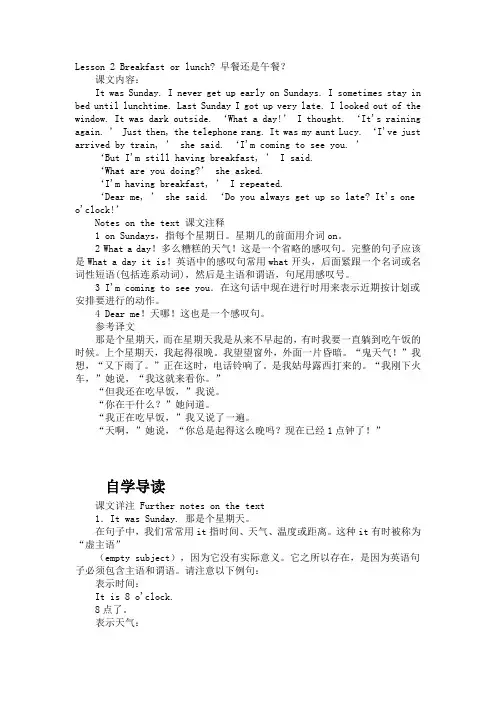
Lesson 2 Breakfast or lunch? 早餐还是午餐?课文内容:It was Sunday. I never get up early on Sundays. I sometimes stay in bed until lunchtime. Last Sunday I got up very late. I looked out of the window. It was dark outside. ‘What a day!’ I thought. ‘It's raining again. ’ Just then, the telephone rang. It was my aunt Lucy. ‘I've just arrived by train, ’ she said. ‘I'm coming to see you. ’‘But I'm still having breakfast, ’ I said.‘What are you doing?’ she asked.‘I'm having breakfast, ’ I repeated.‘Dear me, ’ she said. ‘Do you always get up so late? It's one o'clock!’Notes on the text 课文注释1 on Sundays,指每个星期日。
星期几的前面用介词on。
2 What a day!多么糟糕的天气!这是一个省略的感叹句。
完整的句子应该是What a day it is!英语中的感叹句常用what开头,后面紧跟一个名词或名词性短语(包括连系动词),然后是主语和谓语,句尾用感叹号。
3 I'm coming to see you.在这句话中现在进行时用来表示近期按计划或安排要进行的动作。
4 Dear me!天哪!这也是一个感叹句。
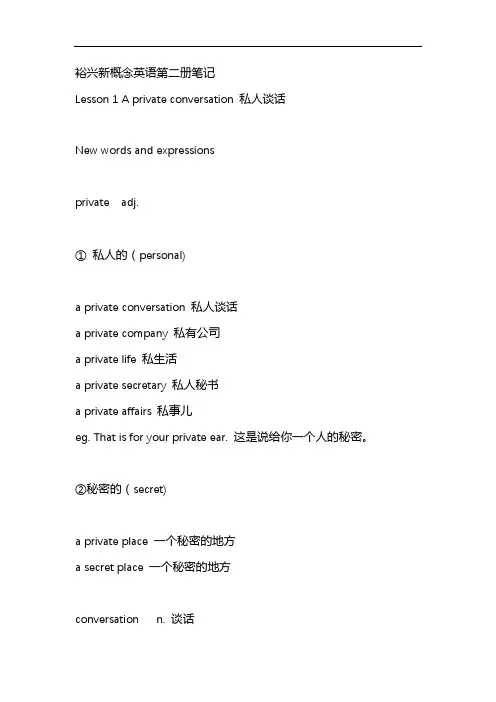
裕兴新概念英语第二册笔记Lesson 1 A private conversation 私人谈话New words and expressionsprivate adj.①私人的(personal)a private conversation 私人谈话a private company 私有公司a private life 私生活a private secretary 私人秘书a private affairs 私事儿eg. That is for your private ear. 这是说给你一个人的秘密。
②秘密的(secret)a private place 一个秘密的地方a secret place 一个秘密的地方conversation n. 谈话谈话:talk; say; speak; chat; discuss; gossipconversation n. 非正式谈话(an informal talk)have a conversation with sb 跟某人谈话eg. I had a quiet conversation with my closest friend. 我跟我最好的朋友进行了密谈。
eg. I saw him in conversation with a friend. 我看见他在和一个朋友谈话。
eg. No conversation while I'm talking. 我讲话的时候不要谈话。
相关短语:1)converse v. converse with sb 跟某人谈话2)talk n./v. talk with/to sb 和某人谈话talk with/to sb about sth 跟某人谈论什么事情3)say vt. say sth 说了一些话eg.He said nothing. 他什么也没说。
eg. "What a lovely day," he said.4)speak vt. 讲(语言)speak a foreign language 讲一门外语speak Chinese 讲中文speak English 讲英语speak vi. 谈话speak to sb 和某人谈话speech n. 讲话谈话make a speech 做演讲5)chat n./v. 聊天(talk friendly 友好地谈话)eg. We had a long chat about old times. 我们聊了很多关于过去的事。
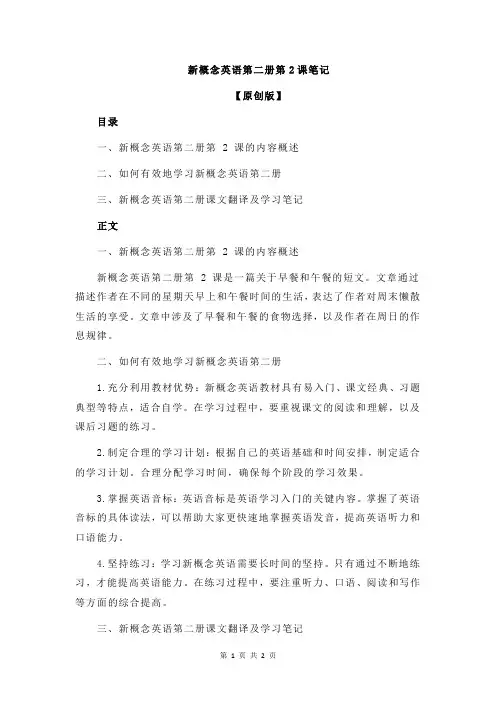
新概念英语第二册第2课笔记【原创版】目录一、新概念英语第二册第 2 课的内容概述二、如何有效地学习新概念英语第二册三、新概念英语第二册课文翻译及学习笔记正文一、新概念英语第二册第 2 课的内容概述新概念英语第二册第 2 课是一篇关于早餐和午餐的短文。
文章通过描述作者在不同的星期天早上和午餐时间的生活,表达了作者对周末懒散生活的享受。
文章中涉及了早餐和午餐的食物选择,以及作者在周日的作息规律。
二、如何有效地学习新概念英语第二册1.充分利用教材优势:新概念英语教材具有易入门、课文经典、习题典型等特点,适合自学。
在学习过程中,要重视课文的阅读和理解,以及课后习题的练习。
2.制定合理的学习计划:根据自己的英语基础和时间安排,制定适合的学习计划。
合理分配学习时间,确保每个阶段的学习效果。
3.掌握英语音标:英语音标是英语学习入门的关键内容。
掌握了英语音标的具体读法,可以帮助大家更快速地掌握英语发音,提高英语听力和口语能力。
4.坚持练习:学习新概念英语需要长时间的坚持。
只有通过不断地练习,才能提高英语能力。
在练习过程中,要注重听力、口语、阅读和写作等方面的综合提高。
三、新概念英语第二册课文翻译及学习笔记新概念英语第二册第 2 课的课文翻译如下:早餐还是午餐?这是一个问题。
周日,我通常不会早起。
有时候,我会在床上直到午饭时间。
上个周日,我起得很晚。
我望向窗外,天色很暗。
真是个特别的一天!在学习这篇课文时,可以注意以下几点:1.理解课文内容,熟读课文,掌握关键词和句子。
2.学习课文中的语法结构,如条件句、时态等。
3.积累课文中的实用短语和表达,如“早餐还是午餐?”、“天色很暗”等。
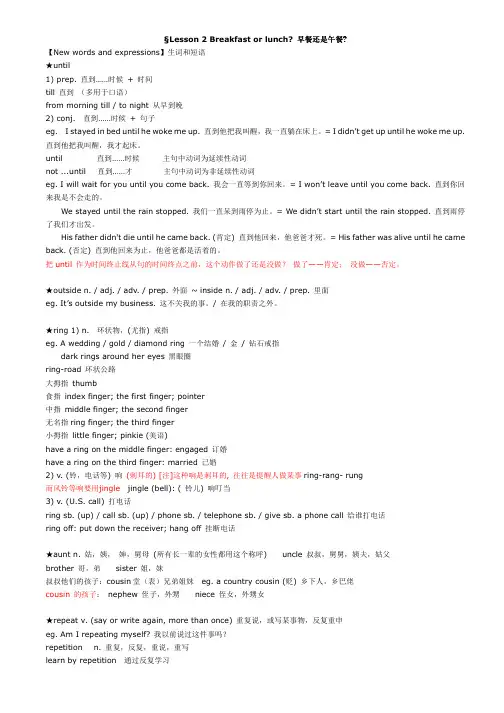
§Lesson 2 Breakfast or lunch?早餐还是午餐早餐还是午餐? ? ?【New words and expressions】生词和短语★until1) prep. 直到……时候+ 时间till 直到(多用于口语)from morning till / to night 从早到晚2) conj. 直到……时候+ 句子eg. I stayed in bed until he woke me up. 直到他把我叫醒,我一直躺在床上。
= I didn’t get up until he woke me up.直到他把我叫醒,我才起床。
until 直到……时候主句中动词为延续性动词not ...until 直到……才主句中动词为非延续性动词eg. I will wait for you until you come back. 我会一直等到你回来。
= I won’t leave until you come back. 直到你回来我是不会走的。
We stayed until the rain stopped. 我们一直呆到雨停为止。
= We didn’t start until the rain stopped. 直到雨停了我们才出发。
His father didn't die until he came back. (肯定) 直到他回来,他爸爸才死。
= His father was alive until he came back. (否定) 直到他回来为止,他爸爸都是活着的。
把until 作为时间终止线从句的时间终点之前,这个动作做了还是没做?做了——肯定;没做——否定。
★outside n. / adj. / adv. / prep. 外面~ inside n. / adj. / adv. / prep. 里面eg. It’s outside my business. 这不关我的事。
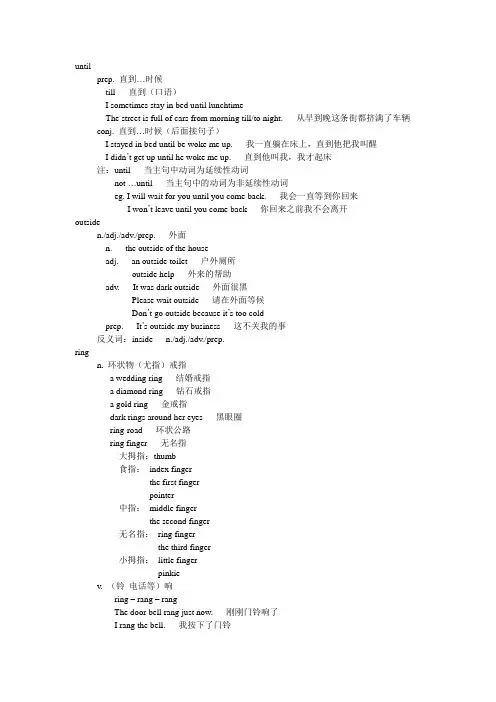
untilprep. 直到…时候till 直到(口语)I sometimes stay in bed until lunchtimeThe street is full of cars from morning till/to night. 从早到晚这条街都挤满了车辆conj. 直到…时候(后面接句子)I stayed in bed until be woke me up. 我一直躺在床上,直到他把我叫醒I didn’t get up until he woke me up. 直到他叫我,我才起床注:until 当主句中动词为延续性动词not …until 当主句中的动词为非延续性动词eg. I will wait for you until you come back. 我会一直等到你回来I won’t leave until you come back 你回来之前我不会离开outsiden./adj./adv./prep. 外面n. the outside of the houseadj. an outside toilet 户外厕所outside help 外来的帮助adv. It was dark outside 外面很黑Please wait outside 请在外面等候Don’t go outside because it’s too coldprep. It’s outside my business 这不关我的事反义词:inside n./adj./adv./prep.ringn. 环状物(尤指)戒指a wedding ring 结婚戒指a diamond ring 钻石戒指a gold ring 金戒指dark rings around her eyes 黑眼圈ring-road 环状公路ring finger 无名指大拇指:thumb食指:index fingerthe first fingerpointer中指:middle fingerthe second finger无名指:ring fingerthe third finger小拇指:little fingerpinkiev. (铃电话等)响ring – rang – rangThe door bell rang just now. 刚刚门铃响了I rang the bell. 我按下了门铃Will you answer the phone when it rings?电话响的时候你去接好吗?v. 打电话ring sb(up)给某人打电话=call sb (up)=phone sb=telephone sb=give sb a phone callI will ring you later. 我迟些给你打电话ring off :挂断电话He rang off before I could explain. 我还没解释呢,他就挂断了电话auntn.姑姨婶舅母uncle n. 叔叔舅舅姨夫姑父brother 哥弟sister 姐妹nephew 侄女外甥niece 侄女外甥女cousin 堂(表)兄弟姐妹a country cousin (贬)乡下人乡巴佬repeatv. 重复说或写某物反复重申“I’m having breakfast” I repeatedI repeated the question several times. 这个问题我都重复好几遍了Am I repeating myself?我以前说过这事?repetition n. 重复重说重写neveradv. 从未未成永不I have never been abroad. 我从未出过国Would you do that?你会做那件事吗?Never 绝对不会I never get up before 10 o’clock in mornings. 上午10点之前我从不起床Never fear 不要害怕Never give up 永不放弃Never say die 永不言败Never lose heart 绝不要灰心丧气earlyadj./adv.an early morning 一大早The early bird catches the worm. 早起的鸟有虫吃I got up early this morning. 今天我起的很早get up 起床go to bed 去睡觉fall asleep 睡着了=go to sleepstay up late 熬夜latelyadv.最近Have you been abroad lately?你最近出国了吗?I bought a new car lately. 我最近买了一辆新车注:lately通常用在现在完成时和一般过去时中look out of 向…外看look out of windowlook out of doorlook into(1)向…里看look into the box(2)调查The police are looking into the case. 警察正在查这件案子Look out!小心Look out!The car early knocked you over. 小心,那辆车差点撞到你What a terrible day!多糟糕的天那What a wonderful day!多好的天啊=What a lovely day!=What a beautiful day!Just then = at the moment 就在那一刻I came here on foot. 我走来的=I walked hereby bus/train/plane(air)/ship(sea water)表示交通方式用by直接加交通工具take a bus/train/plane(air)/ship(sea water)强调动作本身用“take a”加交通工具eg. In order to go to school on time I took a taxi. 为了准时去上学,我打了一辆出租车have breakfastlunchdinnerhave a meal 吃一顿饭Dear me!天呐(Br.)My god!天呐(Am.)it 做虚主语It’s one o’clock 时间It’s cold in winter 气候It’s only me 人It’s a long way from here 距离It’s very dirty here 环境感叹句引导感叹句的词只有:what 修饰名词,强调名词本身how 修饰adj. adv.表示程度结构一:What + a/an (+ adj.) + 可数名词单数(+主语+谓语)!注:如果没有形容词,大多指坏得方面,有时也需要看语境语气结构二:What + adj. + 可数名词复数/ 不可数名词(+主语+——谓语)!结构三:How + adj./adv. (+主语+谓语)结构四:How + adj. + a/an +可数名词单数+ (主语+谓语)注:如果没有adj. 或adv.就不能用how 引导复数名词一般有what 引导Eg.(1)This is a wonderful garden.What a wonderful garden this is!How wonderful a garden this is!(2)This is a surprise.What a surprise this is!(不能用how 引导,因为没有adj. adv.)(3)He is causing a lot of trouble.What a lot of trouble he is causing!(4)They are wonderful actors.What wonderful actors they are!(复数名词一般用what 引导)(5)She is a hard-working woman.What a hard-working woman she is!How hard-working a woman she is!(6)It is a tall building.What a tall building it is!How tall a building it is!(7)It is a terrible film.What a terrible film it is!How terrible a film it is!(8)Y ou are a clever boy.What a clever boy you are!How clever you are!(9)She is a pretty girl.What a pretty girl she is!How pretty a girl she is(10)H e is a strange guy.What a strange guy he is!How strange a guy he is!(11)S he is a lovely girl.What a lovely girl she is!How lovely a girl she is!(12)T his is an interesting play.What an interesting play this is!How interesting an play this is!(13)H e is a rude fellow.What a rude fellow he is!How rude a fellow he is!。
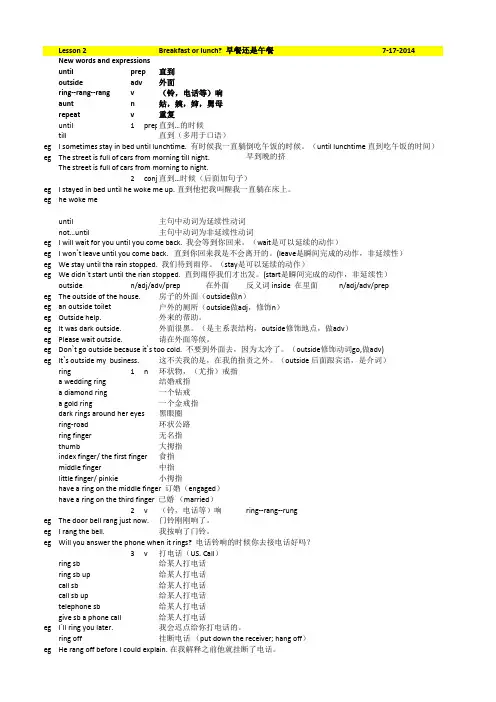
Lesson 2Breakfast or lunch? 早餐还是午餐7-17-2014New words and expressions until prep 直到outside adv 外面ring--rang--rang v (铃,电话等)响aunt n 姑,姨,婶,舅母repeat v 重复until 1prep 直到…的时候till 直到(多用于口语)egI sometimes stay in bed until lunchtime. 有时候我一直躺倒吃午饭的时候。
(until lunchtime 直到吃午饭的时间)egThe street is full of cars from morning till night.这条街上从早到晚的挤The street is full of cars from morning to night.2conj 直到…时候(后面加句子)egI stayed in bed until he woke me up. 直到他把我叫醒我一直躺在床上。
eg I didn`t get up until he woke meuntil 主句中动词为延续性动词not…until 主句中动词为非延续性动词eg I will wait for you until you come back. 我会等到你回来。
(wait 是可以延续的动作)eg I won`t leave until you come back. 直到你回来我是不会离开的。
(leave 是瞬间完成的动作,非延续性)eg We stay until tha rain stopped. 我们待到雨停。
(stay 是可以延续的动作)eg We didn`t start until the rian stopped. 直到雨停我们才出发。
(start 是瞬间完成的动作,非延续性)outside n/adj/adv/prep 在外面反义词 inside 在里面n/adj/adv/prepeg The outside of the house.房子的外面(outside 做n )eg an outside toilet 户外的厕所(outside 做adj ,修饰n )eg Outside help.外来的帮助。
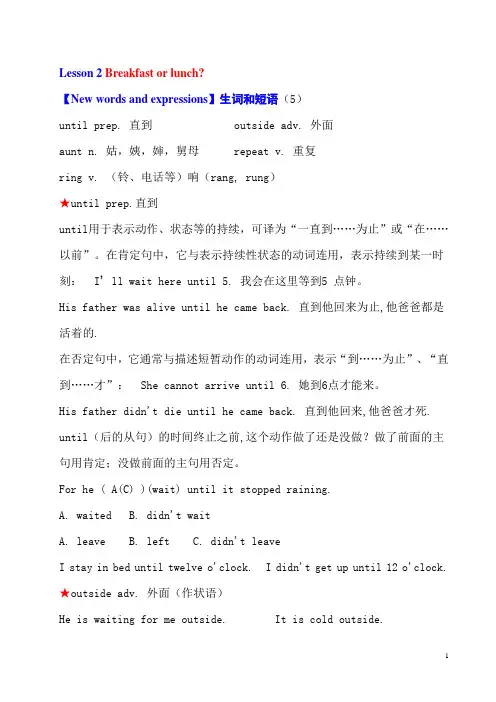
Lesson 2 Breakfast or lunch?【New words and expressions】生词和短语(5)until prep. 直到 outside adv. 外面aunt n. 姑,姨,婶,舅母 repeat v. 重复ring v. (铃、电话等)响(rang, rung)★until prep.直到until用于表示动作、状态等的持续,可译为“一直到……为止”或“在……以前”。
在肯定句中,它与表示持续性状态的动词连用,表示持续到某一时刻: I’ll wait here until 5. 我会在这里等到5 点钟。
His father was alive until he came back. 直到他回来为止,他爸爸都是活着的.在否定句中,它通常与描述短暂动作的动词连用,表示“到……为止”、“直到……才”: She cannot arrive until 6. 她到6点才能来。
His father didn't die until he came back. 直到他回来,他爸爸才死. until(后的从句)的时间终止之前,这个动作做了还是没做?做了前面的主句用肯定;没做前面的主句用否定。
For he ( A(C) )(wait) until it stopped raining.A. waitedB. didn't waitA. leaveB. leftC. didn't leaveI stay in bed until twelve o'clock. I didn't get up until 12 o'clock. ★outside adv. 外面(作状语)He is waiting for me outside. It is cold outside.★ring(rang. rung) v.(铃、电话等)响① vt. 鸣,(铃、电话等)响(这种响是刺耳的, 往往是提醒人做某事) Every morning the clock rings at 6. The telephone(door bell) is ringing. 而风铃等响要用jingle['dʒɪŋg!],jingle (bell) (铃儿) 响叮当② vt. 打电话给(美语中用call)ring sb. 给某人打电话 Tomorrow I'll ring you.③ n. (打)电话give sb. a ring Remember to give me a ring. /Remember to ring me.④ n. 戒指★aunt n. 姑,姨,婶,舅妈(所有长一辈的女性都用这个称呼)男性则是uncle: 叔叔他们的孩子:cousin 堂兄妹(不分男女)cousin的孩子:nephew 外甥;niece 外甥女★repeat v. 重复① vt. 重复Will you repeat the last word? They are repeating that wonderful paly.② vi. 重做,重说Please repeat after me. Don’t repeat.【Text】It was Sunday. I never get up early on Sundays. I sometimes stay in bed until lunch time. Last Sunday I got up very late. I looked out of the window. It was dark outside. …What a day!' I thought. …It's raining again.' Just then, the telephone rang. It was my aunt Lucy. …I've justarrived by train,' she said. …I'm coming to see you.'…But I'm still having breakfast,' I said.…What are you doing?' she asked.…I'm having breakfast,' I repeated.…Dear me,' she said. 'Do you always get up so late? It's one o'clock!' 参考译文:那是个星期天, 而在星期天我是从来不早起的, 有时我要一直躺到吃午饭的时候. 上个星期天, 我起得很晚. 我望望窗外, 外面一片昏暗. “鬼天气!”我想, “又下雨了. “正在这时, 电话铃响了. 是我姑母露西打来的. “我刚下火车, “她说, “我这就来看你.”“但我还在吃早饭,”我说.“你在干什么?”她问道.“我正在吃早饭,”我又说了一遍.“天啊,”她说, “你总是起得这么晚吗?现在已经1 点钟了!”【课文讲解】1、It was Sunday.it 指时间、天气、温度或距离,it被称为“虚主语”(empty subject)。
NCE2023.txt【New words and expressions】(4)★complete v. 完成(喜欢与建筑工程连用)①vt. 完成,结束complete the building②adj. 完整的,全部的《鲁迅全集》中的“全集”就用“complete”This is a complete family.③adj. 十足的,彻底的,绝对的There is complete silence in the room.finish v. 完成finish/complete homeworkfinish/complete doing sth. 某事做完了★modern adj. 新式的, 与以往不同的,现代的modern history/art 现代史/ 现代艺术modernization n.现代化★strange adj. 奇怪的(表示因为对一个东西不熟悉而觉得奇怪, 陌生的)①adj. 外地的,异乡的Living in a strange land is not always a pleasant thing.②adj. 陌生的,生疏的That morning, he saw a strange face in the classroom.be strange to sth. 对……不习惯, 对……陌生This city is quite strange to me.stranger n. 陌生人③adj. 不平常的,奇特的,奇怪的,古怪的The house looks strange to some people.★district n. 地区,行政划分的区域, 城市内的district n. 地区,行政区,地域,地带,通常隶属于某个整体或具有某些地理特征The Lake District of Northern England is very beautiful. 英国北部的湖区非常美丽。
Lesson2Breakfast or lunch?早餐还是午餐?It was Sunday.I never get up early on Sundays.I sometimes stay in bed until st Sunday I got up very late.I looked out of the window.It was dark outside.‘What a day!‘I thought.'Its raining again.'Just then,the telephone rang.It was my aunt Lucy.I've just arrived by train,'she said:I'm coming to see you!But I'm still having breakfast,'I said.‘What are you doing?‘she asked.‘I'm having breakfast,'I repeated.'Dear me,'she said.'Do you always get up so late?It's one o’clock!那是个星期天,而在星期天我是从来不早起的,有时我要一直躺到吃午饭的时候。
上个星|期天,我起得很晚。
我望望窗外,外面一片昏暗。
"鬼天气!"我想,"又下雨了。
"正在这时,电话铃响了。
是我姑母露西打来的。
"我|刚下火车,"她说,"我这就来看你。
""但我还在吃早饭,"我说。
"你在干什么?"她问|道。
"我正在吃早饭,"我又说了一遍。
"天啊,"她说,"你总是起得这么晚吗?现在已经1点钟了!”1.get up起床=get out of bed2.on Sunday(s)在星期天=on every Sunday3.sometimes是一个频率副词,一般用于一般现在时some times几次;几倍(注:此为中式英语,地道英语应为:several times)some time一段时间sometime将来或过去的某个时候I will be somebody sometime in the future.总有一天我将成为大人物。
Lesson 2 Breakfast or lunch?一.单词讲解New words and expressionsuntil prep、直到outside adv、外面ring (rang rung)v、(铃、电话等)响aunt n、姑、姨、婶、舅妈repeat v、重复★1、untilprep、直到。
时候till 直到(多用于口语)eg、I sometimes stay in bed until lunchtime、有时候我一直躺倒吃午饭得时间。
The street is full of cars from morning till/to night、这条街上从早到晚得挤满了车辆。
conj、直到。
时候(后面加句子)eg、I stayed in bed until he woke me up、直到她把我叫醒我一直躺在床上。
I didn’t get up until he woke me up、直到她把我叫醒我才起床。
until 主句中动词为延续性动词时用untilnot…until 主句中动词为非延续性动词时用not…untileg、I will wait for you until you come back、我会一直等到您回来。
I won’t leave until you come back、直到您回来我就是不会走得。
eg、We stayed until the rain stopped、我们一直等到雨停为止。
We didn’t start until the rain stopped、直到雨停了我们才出发。
★2、outside n、/adj、/adv、/prep、1) n、外部;外观eg、the outside of the house 房子得外面2) adj、外面得,外部得;外来得eg、an outside toilet 户外得厕所toilet ['tɔɪlət] n、厕所,盥洗室;梳妆,打扮outside help 外来得帮助3)adv、在外面,向外面;在室外eg、It was dark outside、外面很黑。
以下是新概念英语第二册第2课的学习笔记,主要包括生词、语法和练习等方面:生词:1. present n.礼物2. beautiful adj.漂亮的3. really adv.确实4. house n.房子5. received v.收到6. flower n.花7. for prep.为了8. young adj年轻的9. think v.想10. cost v.值(多少钱)语法:1. 现在完成时:have/has+过去分词,表示过去发生的动作对现在造成的影响或结果。
例如:I have received a beautiful present.(我收到了一份漂亮的礼物。
)2. 序数词的用法:序数词表示第几时,前面一般加the。
例如:This is the second time that I have visited China.(这是我第二次访问中国。
)3. 形容词的比较级和最高级:形容词的比较级和最高级一般在词尾加-er或-est。
例如:My younger sister is younger than me.(我的小妹妹比我小。
)4. 介词的用法:for表示目的,后面跟名词或动名词。
例如:I bought this book for my mother.(我给我妈妈买了这本书。
)练习:1. 填空题:根据课文内容填空,巩固所学知识。
2. 选择题:针对语法和词汇进行测试,加深对知识点的理解和记忆。
3. 翻译题:将英文句子翻译成中文,检验自己的语言运用能力。
4. 听写题:通过听录音并写下听到的内容,提高听力理解能力。
5. 口语练习:跟读课文录音并模仿发音,加强口语表达能力。
6. 阅读理解:阅读短文并回答问题,提高阅读理解能力。
新概念英语第二册第2课笔记摘要:I.课程背景与简介- 新概念英语第二册第2 课- 课程内容简介II.课程重点- 课文内容概述- 重点词汇与语法- 难点解析III.学习方法与技巧- 学习建议- 技巧应用IV.总结与反思- 学习收获- 反思与展望正文:I.课程背景与简介新概念英语第二册第2 课是一篇关于早餐和午餐的日常对话。
通过两个人的对话,让学生学习日常生活中的基本英语交流。
本课程的主要内容包含词汇、语法和日常口语表达。
II.课程重点A.课文内容概述本课的主要内容是两个人的对话,一个人询问另一个人早餐和午餐吃了什么。
对话中涉及到的主要食物词汇有:egg、toast、juice、apple、orange、breakfast、lunch 等。
通过学习这篇课文,学生可以掌握一些基本的日常食物词汇,并学会用英语描述早餐和午餐。
B.重点词汇与语法1.食物词汇:egg(鸡蛋)、toast(吐司)、juice(果汁)、apple(苹果)、orange(橙子)等。
2.疑问词:what(什么)、where(哪里)、when(什么时候)等。
3.特殊疑问句:What did you have for breakfast/lunch?(你早餐/午餐吃了什么?)C.难点解析1.食物词汇的英文表达2.特殊疑问句的构成和用法III.学习方法与技巧A.学习建议1.多读课文,熟悉课文内容和语言表达。
2.重点掌握食物词汇和特殊疑问句的用法。
3.结合课后练习,巩固所学知识。
B.技巧应用1.通过学习生活中的实际场景,提高口语表达能力。
2.学会用特殊疑问句进行日常交流。
IV.总结与反思A.学习收获通过本课的学习,学生可以掌握一些基本的日常食物词汇,并学会用英语描述早餐和午餐。
同时,学生还可以学会特殊疑问句的构成和用法,提高日常口语表达能力。
B.反思与展望在学习过程中,学生应积极参与课堂活动,充分利用课外资源,提高自己的英语水平。
Lesson2 Breakfast or lunch? 早餐还是午餐?1. until1) prep.直到⋯..时候till直到(多用于口语)I sometimes stay in bed until lunchtime.有时候我一直躺到吃午饭的时候。
The street is full of cars from morning t ill /to night. 这条街从早到晚都挤满了车辆2) conj.直到⋯⋯时候(后面加句子)I stayed in bed until he woke me up.我一直躺在床上,直到他叫醒我。
I didn’ t get up until he woke me up.直到他叫醒我。
我才起床。
以上两句话含义是一致的。
until主句中动词为延续性动词not ⋯⋯ until主句中动词为非延续性动词stay是延续性动词get up瞬间就完成的动作,是非延续性动词I will wait for you until you come back.我会一直等到你回来。
I won ’ t leave until you come back.直到你回来我才会走。
We stayed until the rain stopped.我们一直待到雨停为止。
We did ’ t start until the rain stopped.直到雨停了,我们才出发。
2.outside n./adj./adv./prep外面1) n.the outside of the home 房子的外面2) adj.an outside toilet房外的厕所outside help外来的帮助3) adv.It was dark outside.外面很黑Please wait outsime.请在外面等候。
Don’ t go outside because it’ s too不要cold出去.,因为外面太冷。
Lesson 2Breakfast or lunch?单词讲解关键句型课文讲解练习复习补充内容一.单词讲解New words and expressionsuntil prep. 直到outside adv. 外面ring (rang rung) v. (铃、电话等)响aunt n. 姑、姨、婶、舅妈repeat v. 重复★ 1. until1)prep. 直到。
时候till 直到(多用于口语)eg. I sometimes stay in bed until lunchtime. 有时候我一直躺倒吃午饭的时间。
The street is full of cars from morning till/to night. 这条街上从早到晚的挤满了车辆。
2)conj. 直到。
时候(后面加句子)eg. I stayed in bed until he woke me up. 直到他把我叫醒我一直躺在床上。
I didn’t get up until he woke me up. 直到他把我叫醒我才起床。
until 主句中动词为延续性动词时用untilnot…until 主句中动词为非延续性动词时用 not…untileg. I will wait for you until you come back. 我会一直等到你回来。
I won’t leave until you come back. 直到你回来我是不会走的。
eg. We stayed until the rain stopped. 我们一直等到雨停为止。
We didn’t start until the rain stopped. 直到雨停了我们才出发。
★2.outside n./adj./adv./prep.1) n.eg. the outside of the house 房子的外面2) adj.eg. an outside toilet 户外的厕所outside help 外来的帮助3)adv.eg. It was dark outside. 外面很黑。
Please wait outside. 请在外面等候。
Don’t go outside because it’s too cold. 不要出去因为太冷了。
4)prep.eg. It’s outside my business. 这不关我的事。
反义词:inside n./adj./adv./prep.★3. ring1) n. 环状物,(尤指)戒指a wedding ring 婚戒 a diamond ring 钻戒 a gold ringdark rings around her eyes 黑眼圈ring-road 环状公路ring finger 无名指大拇指:thumb 食指:index finger; the first finger; pointer中指:middle finger; the second finger; 无名指:ring finger; the third ginger 小拇指:little finger; pinkiehave a ring on the middle finger (engaged 订婚)have a ring on the third finger (married 已婚)2)v. (铃,电话等)响ring – rang – rungeg. The door bell rang just now. 刚刚门铃响了。
I rang the bell. 我按响了门铃。
Will you answer the phone when it rings? 电话响的时候你去接电话好吗?3)v. (=U.S. call) 打电话ring sb (up) 给某人打电话=call sb (up) = phone sb = telephone sbgive sb a phone calleg.I’ll ring you later. 我会晚点给你打电话。
ring off: put down the receiver; hang off 挂断电话eg. He rang off before I could explain. 我还没解释他就挂断电话了。
★4.aunt n. 姑,姨,婶,舅母uncle 叔叔,舅舅,姨父,姑父brother sisternephew 侄子,外甥niece 侄女,外甥女cousin 堂(表)兄弟姐妹eg. a country cousin (贬)乡下人,乡巴佬★5.repeat v.(say or write again, more than once)重复说,或写某事物,反复重申eg.“I’m having breakfast,”I repeated. 我重复说:“我正在吃早饭呢。
”eg. I repeated the question several times. 这个问题我重复了好几遍了。
eg. Am I repeating myself? 我以前说过这件事情吗?repetition n. 重复,反复,重说,重写learn by repetition 通过反复学习二.关键句型Key structures一般现在时和现在进行时的用法----一般现在时1.动词构成:谓语动词使用动词原形;系动词为am, is, are 的形式。
主语是第三人称单数时,谓语动词需有变化:1)直接加“s”;gives takes asks2)以辅音字母加“y”结尾的动词,变“y”为“i”,再加“es”;carry – carries3)以“o, s, x, ch, sh,”结尾的动词加“es”。
goes dresses watches brushes2.功能:1)表达习惯性,规律性的动作eg. I never get up early on Sundays. 星期天我从来都不早起。
I sometimes stay in bed until lunchtime. 有时候我一直躺倒吃午饭的时间。
2)表达现在的事实状态或动作eg. We all like football. 我们都喜欢足球。
Birds fly. 鸟会飞。
This picture is of great value. 这幅画具有极大的价值。
3)表达客观真理,格言警句或事实eg. The earth moves round the sun. 地球绕着太阳转。
The sun rises in the east and sets in the west. 太阳东升西落。
Two and two makes four. 二加二等于四。
Seeing is believing. 眼见为实。
3.经常搭配的副词:often sometimes usually alwaysevery year seldom occasionally frequently副词的位置:通常放在实义动词之前,助动词之后。
eg. He doesn’t always come by train. 他不总是坐火车来。
Do you ever read in bed? 你在床上躺着看过书吗?I never like jazz. 我从来都不喜欢爵士乐。
He rarely gets up before 10 o’clock. 在10点之前他很少起床。
We frequently have lunch at this restaurant. 我们总在这家餐馆吃饭。
----现在进行时1.构成:am / is /are + doing…2.功能:1)表示现在,目前正在做某事,正在进行的动作。
eg. It is raining. 正在下雨。
I am still having breakfast. 我正在吃早饭。
What are you doing? 你干吗呢?We are enjoying our lunch. 我们正在享用午餐。
2)表示现阶段正在进行的动作。
eg. We are studying English this summer. 今年夏天我们在学英语。
He is taking physics this semester. 这一学期他正在学物理。
3.可用进行时态来表示即将开始的动作go come leave arrive land meet die start return joineg. I am coming to see you. 我就来看你了。
The bus is coming. 公共汽车就要来了。
The plane is leaving for Shanghai. 飞机就要飞往上海了。
The old man is very ill and he is dying. 这个老人病的非常严重,他现在就快要死了。
4.有些副词用在进行时中间,表示说话人带有感情色彩,如赞赏,厌恶等。
always forever continually constantlyeg. He is always lying. 他总是在说谎。
You are constantly complaining. 你总是在抱怨。
The girl is always thinking of others. 这个女孩总是考虑别人。
The naughty boy is continually making noises. 这个淘气的孩子总是在制造噪音。
5.下列表示状态,感觉,情绪,精神活动的动词不用于进行时态。
用一般现在时。
Believe doubt see hear know understand belong to think consider feel look seem show mind have sound taste require possess care like hate love detest desire6.现在进行时通常搭配以下副词now at present at this time these days----Exercise A1.I am looking out of my window. I can see some children in the street. The children ________ (play) football. They always ________ (play) football in the street. Now a little boy ________ (kick) the ball. Anther boy ________ (run) after him but he cannot catch him.are playing play is kicking is running2.I carried my bags into the hall.“What you ________ (do)?” my landlady asked.“I ________ (leave), Mrs. Lynch,” I answered.“Why you ________ (leave)?” she asked. “You have been here only a week.”“A week is too long, Mrs. Lynch,” I said. “There are too many rules in this house. My friends never ________ (come) to visit me. Dinner is always at seven o’clock, so I frequently ________ (go) to bed hungry. You don’t like noise, so I rarely ________ (listen) to the radio. The heating doesn’t work, so I always ________ (feel) cold. This is a terrible place for a man like me. Goodbye, Mrs. Lynch.”Landlady 女房东are you doing am leaving are you leaving come go listen feel----Exercise B1.My friends never come to visit me.2.I frequently go to bed hungry.3.I rarely listen to the radio.4.I always feel cold.5.I never get up early on Sundays.6.I sometimes stay in bed until lunchtime.1.She answers my letters. (rarely)She rarely answers my letters.2.We work after six o’clock. (never)We never work after six o’clock.3.The shops close on Saturday afternoons. (always)The shops always close on Saturday afternoons.4.Do you go to work by car? (always)Do you always go to work by car?5.Our teacher collects our exercise books. (frequently)Our teacher frequently collects our exercise books.6.We spend our holidays abroad. (sometimes)We sometimes spend holidays abroad.7.I buy CDs. (often)I often buy CDs.8.Do you buy CDs? (ever)Do you ever buy CDs?三.课文讲解TextIt was Sunday. I never get up early on Sundays. I sometimes stay in bed until lunchtime. Last Sunday I got up very late. I looked out of the window. It was dark outside. “What a day!”I thought. “It’s raining again.”Just then, the telephone rang. It was my aunt Lucy. “I’ve just arrived by train,”she said. “I’m coming to see you.”“But I’m still having breakfast,” I said.“What are you doing?” she asked.“I’m having breakfast,” I repeated.“Dear me,” she said. “Do you always get up so late? It’s one o’clock!”1. It was Sunday.过去式那是个星期天。